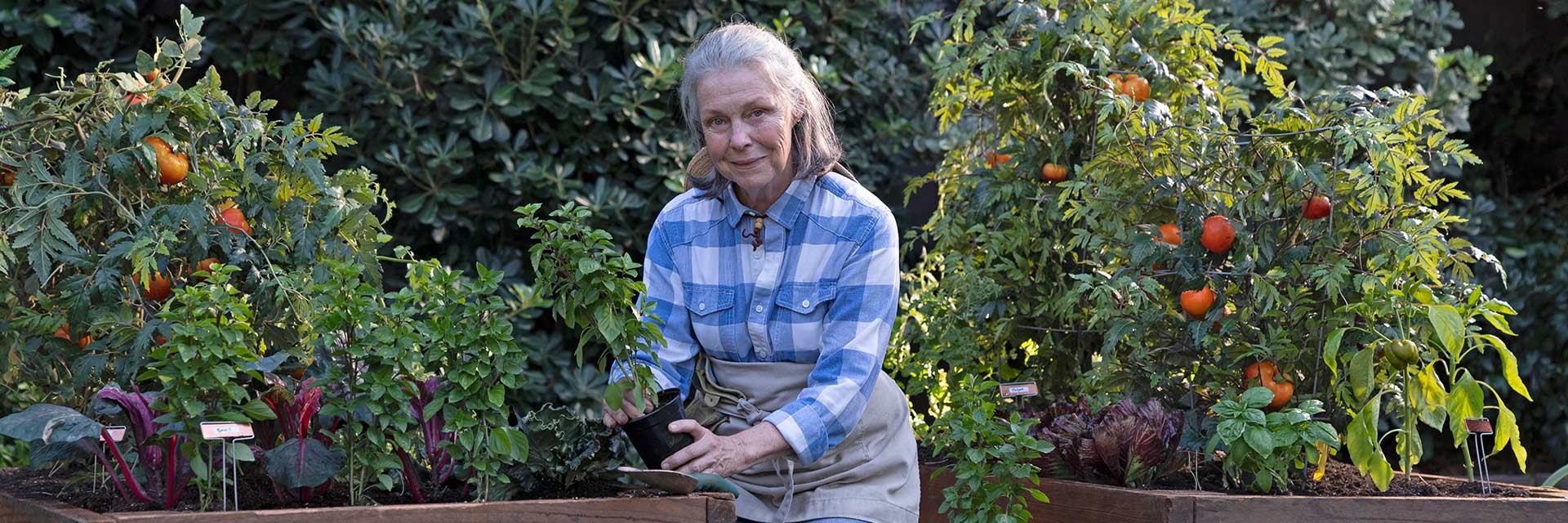Gardening may seem like a relic from our parents’ or grandparents’ generation, but the movement to grow our own fruits, vegetables, and herbs is enjoying quite a resurgence. According to Farm and Dairy, many Americans are growing gardens, not only because they have more time on their hands at home, but also due to questions about potential security and disruption of the food distribution system we’ve relied on for decades.
If you’re one of the growing numbers of people enjoying the benefits of a home garden, you may be finding yourself reaping another reward besides fresh produce: less stress that comes from time spent outdoors, getting your hands dirty, planting, tilling and harvesting your own own food.
In fact, one study showed that gardening can distract you from your worries and stop you from obsessing about your problems. Over 12 weeks, participants saw an improvement in the severity of their depression during and immediately after the gardening study, and three months later, they still reported significant improvements. Thirty minutes of gardening has also been shown to lower cortisol levels, the hormone released by the body when you’re experiencing stress.
Gardening is Mary L.’s stress reliever, and the rewards are many, the Dallas gardener says.
“I started gardening because life was beginning to stress me out,” she says. “When I put my hands in the dirt, I get a natural euphoric feeling, the stress of daily life just doesn’t exist — I’m surrounded by beauty that I created out of nothing!”
Mary is a member of the Facebook group North Texas Vegetable Gardeners. She and her fellow gardeners trade tips, help identify friendly bugs and pests, and provide encouragement to new gardeners. For members of the group, the produce they grow is just one benefit of the hobby.
“I find gardening soothing, a feeling of accomplishment when I get to harvest my fresh vegetables,” says Shannon T. of Mineral Wells. “It gives me time to not think of anything, and I like the feeling of the earth in my hands.”
“It’s very relaxing to me,” Richardson mom Carrie Ann M. says. “I stay home with my kids all day and my husband works 60-plus hours a week, so it’s a great way for me to unwind and just have a place to think, but somewhere my kids can be with me as well.”
Carrie Ann says that spending time with her children in the garden reaps both good food and bonding time. It’s also a great way to de-stress, she says.
“Working in the garden definitely helps with stress,” she says. “I’m not sure if it’s the fresh air, lack of technology, or knowing it’s something that’s been passed down from generation to generation, but I always feel so much better after working in the garden.”
“I feel pride when I grow food we can eat. It’s calming,” Veronica H. of Dallas says. “I have PTSD, and gardening makes me happy and hopeful.”
“The garden is an environment where we experience, we experiment, we learn (often by our mistakes), we produce, we carry on old traditions, we contribute to better health, we share our experience with others,” Cathy D. of Point says. “We use many of our muscles and build core strength, endurance and agility.”
Gardening, as Cathy mentions, can also have physical benefits. Things such as pulling weeds and planting plants can burn anywhere from 200 to 400 calories per hour. More labor-intensive work like landscaping or moving dirt or rocks can burn a hefty 400 to 600 calories an hour. It’s also a workout that provides endurance, flexibility and strength exercises.
And as with any form of exercise, warming up and stretching can help muscles get ready for work. Experts also recommend treating gardening just like any other form of exercise — which means you need to warm up and stretch before starting a project.
“If you go out there cold, you’re risking injury,” says Randy Turner, the manager of the Texas Health Harris Methodist Hospital Fort Worth Fitness Center. “The recommendations now are to get your muscles a little warm, and then stretch before and after any activity.”
Since gardening can use muscles you might not be used to flexing, checking with your doctor about any potential limitations to your new hobby is a good idea, the Centers for Disease Control says.
If you’d like to head outdoors and create a garden of your own, it’s important to remain hydrated, and plan for frequent water breaks, especially during these sweltering North Texas summers. Use an insect repellent, and remember that the hours between 10 a.m. and 4 p.m. are the peak hours for UV exposure — so reapply sunscreen frequently and consider a wide-brimmed hat.
Need some help getting started? Urban Farmer offers up plenty of information about optimal growing seasons and conditions for your favorite fruits and vegetables. For instance, most of North Texas is within growing zone 8, which means your growing system may look different from your friends or family’s growing season in the Panhandle or South-Central Texas.
And remember, a garden doesn’t have to consist of just fruits and vegetables; if you’re more inclined to start up a bed of roses or change up the greenery around your front yard, the benefits still hold true.
Are you ready to garden? Need to check with a primary care physician first? If you are looking for a doctor, Texas Health Resources offers an easy-to-use tool, or you can call 1-877-THR-WELL for assistance.

